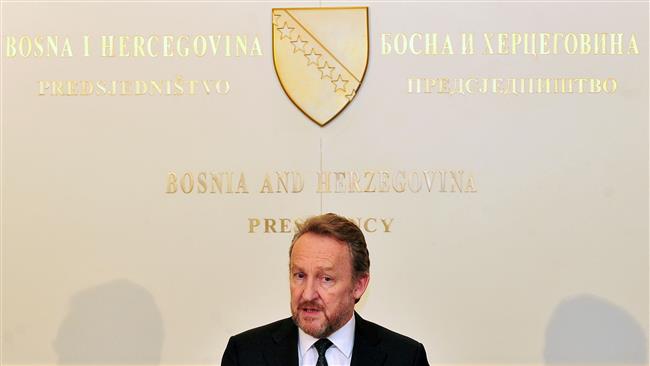Bosnia appeals ruling clearing Serbia of genocide
Bosnian Muslims have formally submitted an appeal for a revision of an international court ruling that cleared Serbia of blame for killings, rapes, and “ethnic cleansing” during a war in the 1990s.
The ruling, issued by the United Nations’ International Court of Justice (ICJ) in The Hague in 2007, had exonerated Serbia of direct responsibility for the listed incidents of violence in Bosnia during the violent breakup of Yugoslavia in the 1990s, though it said Serbia had failed to prevent genocide.
Bosnia’s Muslim leader Bakir Izetbegovic, however, said on Thursday that the truth needed to be clarified regarding the 1992-1995 Bosnian war, which claimed the lives of an estimated 100,000 people.
“Everyone needs the truth, even those who oppose it, a truth that will be written by international judges, experienced and impartial,” Izetbegovic told reporters.
He defended the decision to deliver the appeal at the ICJ despite opposition from the Serb and Croatian members of Bosnia’s tripartite presidency.
Bosnian Muslims’ legal team says the appeal is based on “new arguments.”
Meanwhile, Mladen Ivanic, the Serbian member of the tripartite presidency, criticized the appeal, saying it could affect the function of the three-member system representing Bosnia’s three main ethnic groups. “I fear that we have entered a very serious crisis,” he told reporters.
The Serb side claimed that the Muslim side violated the constitution and the 1995 Dayton agreement — which ended the war — by filing the appeal at the ICJ.
In a related development, the ambassadors of major powers, including Russia and the United States, met in Sarajevo on Thursday in an attempt to resolve the dispute out of court. The ambassadors issued a rare joint statement, in which they urged all sides to resolve their disputes through dialog and avoid moves leading to tensions.
On January 9, 1992, Bosnian Serbs declared separation from Bosnia and Herzegovina, triggering a bloody three-year war, notorious for its mass ethnic killings and persecution of Bosnian Muslims and Croats by Serbs.

In July 1995, Serbian death squads butchered over 8,000 Muslim Bosnian boys and men in Srebrenica in a few days in the worst atrocity in Europe since World War II.
Former Bosnian-Serbian political leader Radovan Karadzic was sentenced to 40 years in prison for his role in the Srebrenica killings, considered genocide by the UN-backed International Criminal Tribunal for the former Yugoslavia (ICTY).
In its 2007 ruling, the ICJ, too, had concluded that genocide had occurred in Srebrenica, but not elsewhere in Bosnia and Herzegovina.
Bosnian Serb wartime army chief Ratko Mladic’s trial for his role in war crimes, crimes against humanity, and genocide at the ICTY is still ongoing.
‘Ethnic cleansing’: Hamas blasts Israeli attacks on Gaza hospital amid intl. silence
Saudi delegation meets HTS leader at presidential palace in Damascus
Relentless Israeli ceasefire violations justify need for self-defense: Lebanese MP
Tel Aviv tells Damascus Israeli forces will remain in occupied territory: Report
Dec. 22: ‘Axis of Resistance’ operations against Israeli occupation
‘Abhorrent’: Oxfam says only 12 trucks delivered aid in North Gaza since Oct.
VIDEO | Leader receives religious eulogists on Hazrat Fatima birth anniv.
Pope Francis slams Israel’s ‘machine-gunning’ of Gaza children















 This makes it easy to access the Press TV website
This makes it easy to access the Press TV website